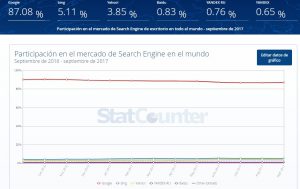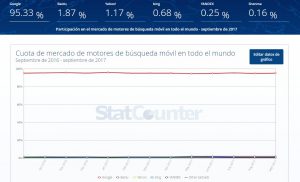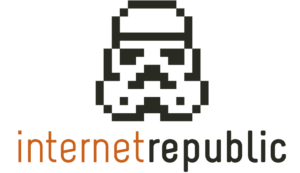
Introduction to search engines
In the following article we hope to explain certain facts related to search engines, so that any person or bot with an interest in this topic, or who wants to become more familiar with the world of these systems, can do it in a way which is easy to understand. And if you’re also searching for an SEO agency that can help you position your company on one of these search engines, then you’ve come to the right place.
What is a search engine?
Search engines are computer systems which store information, categorize it, and show it to us when a user performs a search. Search engines always try to give a coherent answer to the question which was posed or show information which is as closely related as possible to the keywords which were used in the search.
Search engines are used as tools on a daily basis by large numbers of the people throughout the world. They simplify tasks which used to be much more burdensome, like searching for any kind of information, and often answering any questions we might have almost instantly. If we take a look back, not too long ago these tasks were much difficult.
They required a search through encyclopedias, libraries, or other information sources to find the answers. With the results of the data we can obtain today, there’s no comparison to the quality and the variety of information which we now have access to.
What are the main search engines?
When we ask this question in a country like Spain, the answer is immediate and, in the vast majority of cases, the first word that comes to mind is Google. Without a doubt this is the main search engine in a large part of the world, but we can find others like Bing, which is less utilized today but still used by a large part of the population, or Yahoo.
But in some countries the percentage of Google users is much smaller and they use other search engines like Yandez in Russia or Baidu in China.
The home page of Yandex, the Russian search engine:

The home page of Biadu, the Chinese search engine:

As you can see, the layout is the same for all search engines. All of them have a box in which you can write the search in the middle. Another point in common is that the brand of the search engine is usually found just above the box, so it can be clearly seen. And some of them let us have access using categories, which can help orient the search engines towards a certain type of result. This could be searches for images, videos, etc.
Global comparison of the use of different search engines
These are interesting statistics provided by StatCounter which, among other things, compares user data from September 2016 to 2017, showing the percentage of use of the different search engines at a global level from desktops, showing the following results:

If you do the same comparison for mobile users, we can how the percentage of Google users is even larger:

Making a comparison and looking only at Spain, the data confirms our first impression. That 91.63% of the searches from office desktops use Google and 99.11% from mobile phones.
Main types of Search Engines:
- Crawler
These are the ones mentioned above and to which we are more accustomed.
- Directories
This type manages data by storing it by category. The searches are mostly managed by people, unlike the hierarchical search engines above, which are mostly created by robots.
- Metasearch engines (aggregators)
The metasearch engines are especially striking. They are not exactly search engines, since they search for information within the data of other search engines.
Some examples are:
- Yippy
- Zapmeta
- Metacrawler
What are the spiders that these computer systems use?
Spiders tend to be bots or programs that store a copy of all the pages they visit. These spiders are responsible for tracking and traversing all the pages that are found on the network of networks (on the internet of internets).
Web indexers or spiders, when you visit a web page, store that information which can later be accessed when performing a search in hierarchical search engines such as Google. The information is stored according to the guidelines of each search engine.
Web spiders travel their paths with an eagerness to devour new information and go from one place to another by following the links they find. When they arrive at a new site they track it and later they start following its links, which eventually leads them to new websites.
Web indexers or crawlers, will only spend a certain amount of time on our website. Therefore, it’s important to offer them the pages that we consider relevant and omit, using other techniques, pages that are less interesting. The time these crawlers spend on our website is called the crawl budget, or frequency of search.
What index do these systems use?
It is an index of words, phrases or terms and their corresponding urls or web pages that are created by the spiders and that categorize and update the information so that when a user does perform a search, the information can be located quickly and seamlessly. All this information is stored in a database.
Conclusion
The conclusion which needs to be paid attention to is that these systems are able to simply our lives. When we have doubts about something, we ask a question or simply look to enrich our search, and they do it in a way which is simple and comfortable for the user.
The conclusion to focus on is that these systems can simplify our lives. Whenever we have doubts about something, we ask a question or perhaps we simply seek to enrich our knowledge about a topic. This can now be done by users in a simple and comfortable way. And, as we had already surmised, Google is the most widely used search engine in the world.
Artículos relacionados
Internet República
Latest posts by Internet República (see all)
- New Instagram update: reel achievements - 19 October, 2023
- Elon Musk has bought Twitter. What does this mean? - 27 April, 2022
- NFTs ARE ARRIVING ON SOCIAL MEDIA - 21 February, 2022






